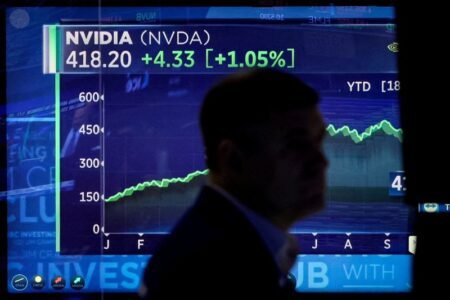By Shubham Batra and Shashwat Chauhan
(Reuters) -U.S. stocks struggled for direction on Monday as investors braced for a slew of economic data this week with their focus on U.S. consumer prices to gauge the outlook on the Federal Reserve’s monetary policy path.
Majority of the Magnificent Seven stocks were lower, with Tesla (NASDAQ:) leading the losses, falling 1.8%. Nvidia (NASDAQ:) rose 4% and was on track to add nearly $100 billion in market value.
Real estate shares and industrials were the top losers among sub-sectors, down 1.0% and 0.6% respectively.
Both the S&P 500 and the recouped most of their losses by the end of last week, after the benchmark index suffered its biggest one-day percentage drop in nearly two years on fears of recession and the unwinding of currency carry trade positions involving the yen.
Investors are likely to be on edge until Wednesday’s U.S. consumer price index (CPI) reading, which is expected to show headline inflation accelerated 0.2% in July on a monthly basis, but remain unchanged at 3% on a year-on-year basis.
Money markets are evenly split between a 50- and a 25-basis-point (bps) cut in U.S. interest rates in September, expecting a total easing of 100 bps by the end 2024, according to CME’s FedWatch Tool.
Figures for July U.S. retail sales on Thursday are likely to show marginal growth, and investors expect that any weakness in the data could reignite fears of a consumer slowdown and a potential recession.
Earnings reports from Walmart (NYSE:) and Home Depot (NYSE:), due later this week, will also be crucial for clues on consumer spending in the world’s largest economy.
“A relatively benign CPI report in line with consensus expectations probably keeps the Fed on course for a September rate cut, but if inflation starts to look troublesome again, some of the calls for 4–5 rate cuts this year may start to look more aggressive,” said investment strategists Jason Pride and Michael Reynolds at Glenmede.
Fed Governor Michelle Bowman softened her usually hawkish tone ever so slightly on Saturday, noting some further “welcome” progress on inflation in the last couple of months but said inflation remains “uncomfortably above” the central bank’s 2% goal and subject to upside risks.
The , Wall Street’s fear gauge, slipped below the crucial 20-point mark after touching a peak of 65.73 a week earlier.
At 11:30 a.m. ET, the fell 165.85 points, or 0.42%, to 39,331.69, the S&P 500 lost 2.63 points, or 0.05%, to 5,340.65 and the Nasdaq Composite gained 31.22 points, or 0.19%, to 16,776.53.
Starbucks (NASDAQ:) climbed 3.5% on reports that activist investor Starboard Value, which holds a stake in the coffee giant, wants the company to take steps to improve its stock price.
KeyCorp (NYSE:) jumped nearly 11.9% after Canada’s Scotiabank bought a minority stake in the U.S. regional lender in an all-stock deal worth $2.8 billion, while Hawaiian Electric dropped 15.6% after the utility firm raised “going concern” doubts.
Declining issues outnumbered advancers by a 1.3-to-1 ratio on the NYSE and by a 1.43-to-1 ratio on Nasdaq.
The S&P 500 posted nine new 52-week highs and six new lows, while the Nasdaq Composite recorded 39 new highs and 126 new lows.
Read the full article here

















